Santiago de Compostela, Spain(西班牙圣地亚哥·孔波斯特拉城)
2024-06-15 Nature Photography Day
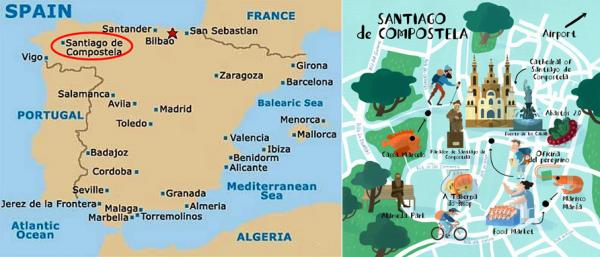
Frederico García Lorca (1898-1936)
The girl with the lovely face,
Goes, gathering olives.
The wind, that towering lover,
Takes her by the waist.
Four riders go by
On Andalusian ponies,
In azure and emerald suits,
On long cloaks of shadow.
‘Come to Cordoba, sweetheart!’
The girl does not listen.
Three young bullfighters go by,
Slim-waisted in suits of orange,
With swords of antique silver.
'Come to Sevilla, sweetheart!'
The girl does not listen.
When the twilight purples,
With the daylight's dying,
A young man goes by, holding
Roses, and myrtle of moonlight.
'Come to Granada, my sweetheart!'
But the girl does not listen.
The girl, with the lovely face,
Goes on gathering olives,
While the wind's grey arms
Go circling her waist.
—— ? —— ? —— ? —— ? —— ? —— ? —— ? ——
【《歌》】
(西班牙)和平统帅·矛·洛尔迦“光明之神”(1898生—1936卒)
【红霞译】
长着可爱脸蛋的姑娘
采摘橄榄。
风,那高大的情人,
依偎她的腰间。
四名骑手经过,驾着
纯种西班牙小马,
身袭湛蓝碧绿穿搭,
外罩魔影长披风。
“来科尔多瓦‘好镇’吧,亲爱的!”
姑娘看都不看一眼。
三位年轻斗牛士经过,
穿着束腰橘黄色套装,
佩挂古银宝剑。
“来塞维利亚‘山谷城’吧,亲爱的!”
姑娘看都不看一眼。
当黄昏变紫,
白昼随之流逝,
有个小伙子经过,手捧
玫瑰,兼有月光紫薇。
“来格拉纳达‘石榴城’吧,我亲爱的!”
可姑娘看都不看一眼。
长着可爱脸蛋的姑娘
只管采摘橄榄,
风的苍白臂膀
环抱她的腰间。
【注】圣地亚哥·孔波斯特拉“星野的后继使徒”城是基督教中仅次于耶路撒冷“和平之城”和罗马“力量之城”的第三圣地,传说耶稣基督被钉十字架后不久,后继使徒来到西班牙传播福音,待回到耶路撒冷之后被希律一世(希律·亚基帕“英雄·野马”)斩首。后继使徒的两名弟子将其尸体带到加利西亚“山丘”(Galicia)——现为“星野的后继使徒”城;直到9世纪初,一位名叫佩拉杰“大海”(Pelagius)的隐士在星辰圣光的指引下来到伊比利亚“西班牙—葡萄牙”半岛西北部即地球尽头的林地,重新发现了被遗忘750年、深受耶稣基督爱戴的后继圣长遗骸,并在原址上修建教堂,“星野的后继使徒”城就这样很快成为基督教最重要的朝拜圣地。
10世纪末,“星野的后继使徒”城惨遭穆斯林摧毁,随后历经一个世纪才得以重建,因而又被视为西班牙基督徒反对伊斯兰教的象征。
“星野的后继使徒”老城兼有罗马式、哥特式和巴洛克式建筑,人称世上最美的街区之一,1985年被联合国教科文组织纳入《世界遗产名录》。
Today in History(历史上的今天):
2024: La Coruna, the Glass City of Spain(西班牙拉科鲁亚“王冠”玻璃城)
2024: Hostal dos Reis Católicos, ESP(西班牙欧洲最美的酒店·天主教皇旅馆)
2024: Archcathedral Basilica of Santiago, ESP(西班牙大主教区圣殿)
2018: A Thankful Note to English Writing Class(感谢便笺)
2014: Jim Thorpe, PA(宾州吉姆索普“明路”镇)
2012: Descriptive─Commentary Speech(应用文─解说辞)
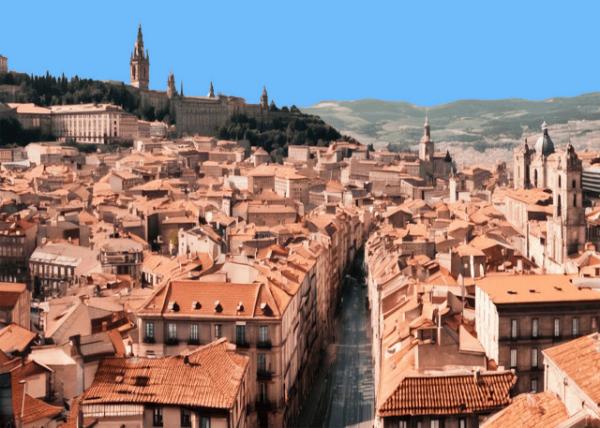 Aeriel Overview of Santiago de Compostela
Aeriel Overview of Santiago de Compostela
(星野的后继使徒城鸟瞰图)
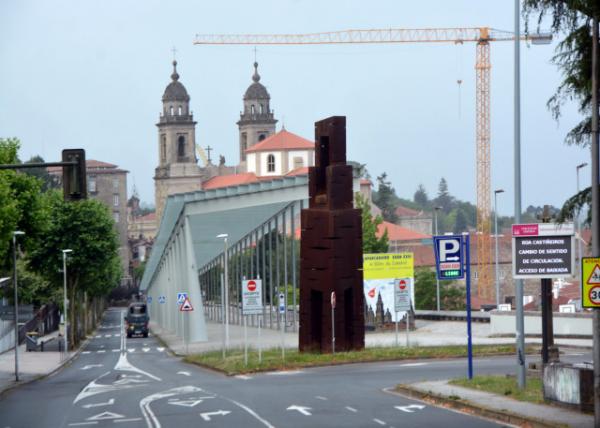 Sculpture of Cardinal Meeting (雕塑《相遇红衣主教》)
Sculpture of Cardinal Meeting (雕塑《相遇红衣主教》)
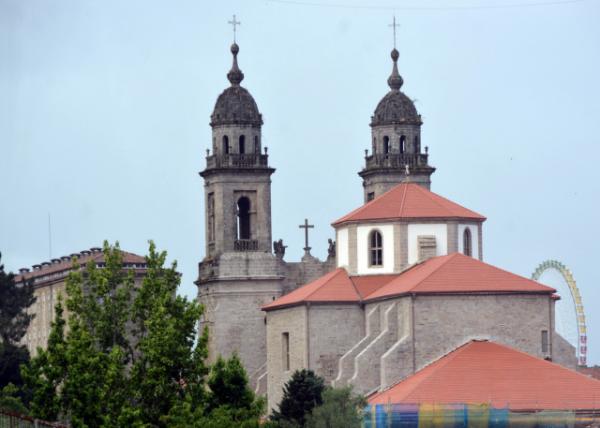 Convent and Church of San Francisco Eminently Baroque Dated from the 17th Century
Convent and Church of San Francisco Eminently Baroque Dated from the 17th Century
(具有17世纪巴洛克“不规则”风格的自由使徒修女院和教堂)

Church of San Fiz de Solovio in a Baroque Style Dated back to the 18th Century
(拯救之子教堂·巴洛克风格,其历史可追溯至18世纪)
 Monastery of San Francisco w/ Monument
Monastery of San Francisco w/ Monument
(自由使徒修道院和纪念碑)
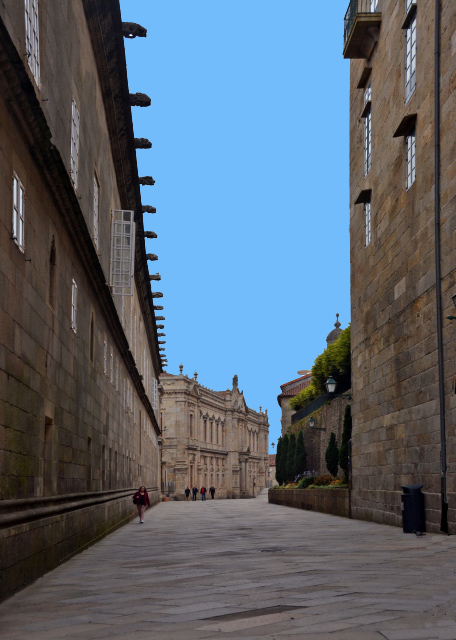
Rua de San Francisco (自由使徒路)
 Hostel of the Catholic Kings, Founded by the Catholic Monarchs as a Hostel for Pilgrims who had completed the Way of Saint James
Hostel of the Catholic Kings, Founded by the Catholic Monarchs as a Hostel for Pilgrims who had completed the Way of Saint James
(天主教皇旅馆·由天主教皇为完成后继使徒之路朝圣者建立的旅馆)

The Tunnel Running beneath the Archbishop's Palace
(大主教宫下的隧道)
 Stone Pillars (石柱)
Stone Pillars (石柱)

Basilica of Santiago de Compostela w/ Western Fa?ade in Romanesque, Gothic, and Baroque Completed in 1211
(星野的后继使徒大教堂·1211年竣工,西立面为罗马式、哥特式、巴洛克式建筑风格)
 College of San Xerome Founded in 1501, the Seat of the Rectorate of the University of Santiago
College of San Xerome Founded in 1501, the Seat of the Rectorate of the University of Santiago
(成立于1501年的圣名使徒学院·后继使徒学院院长所在地)
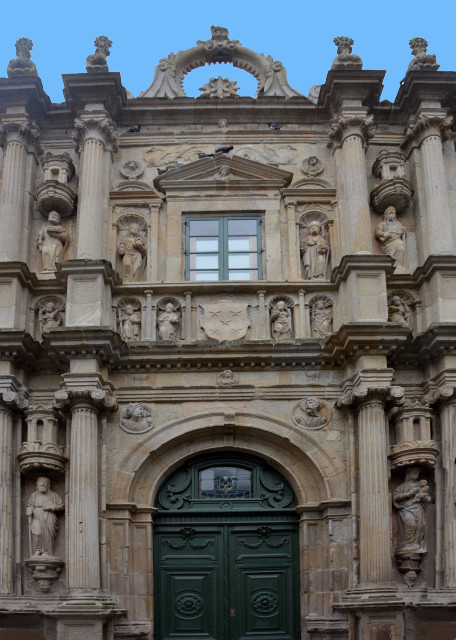
Palace of Fonseca, Built in the 18th Century & Originally Served as the Residence of the Fonseca Family & Housed the Faculty of Geography & History of the Univ Today
(建于18世纪的干井宫·最初是干井家族的住所,如今是大学地理与历史学院的所在地)
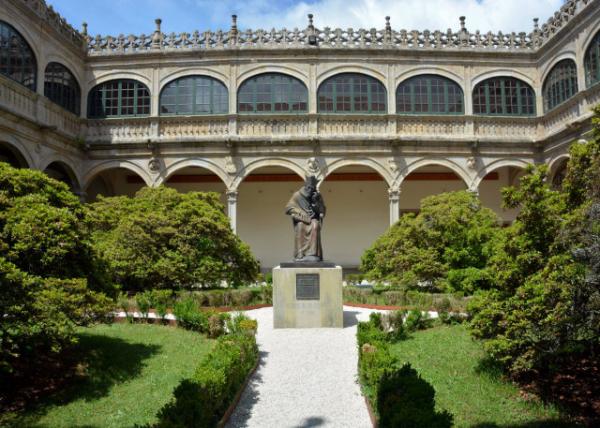 Palace of Fonseca, Courtyard Surrounded by an Epigraphic Legend
Palace of Fonseca, Courtyard Surrounded by an Epigraphic Legend
(干井宫·充满碑学传说的庭院)

Fonseca Fountain (干井喷泉)
 Palace of Raxoi in Neoclassical Completed in 1766, the Seat of the City Council & Regional Government
Palace of Raxoi in Neoclassical Completed in 1766, the Seat of the City Council & Regional Government
(新古典主义风格的教皇宫·1766年竣工,现为市议会和地区政府所在地)
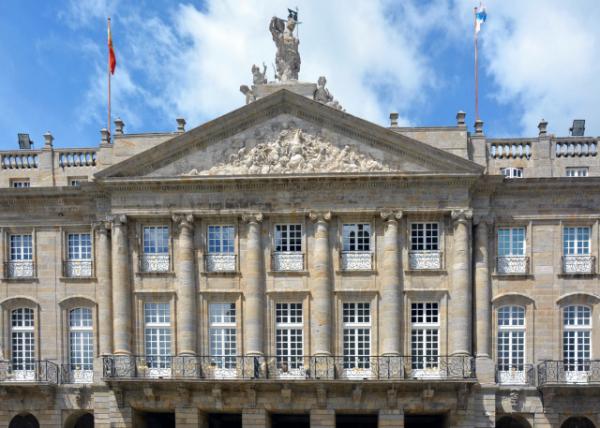 Santiago Matamoros "the Moor Slayer" on Top of the Central Pediment of Pazo de Raxoi
Santiago Matamoros "the Moor Slayer" on Top of the Central Pediment of Pazo de Raxoi
(教皇宫雕像《后继使徒·摩尔“阿拉伯”杀手》·位于中央山形墙顶部)
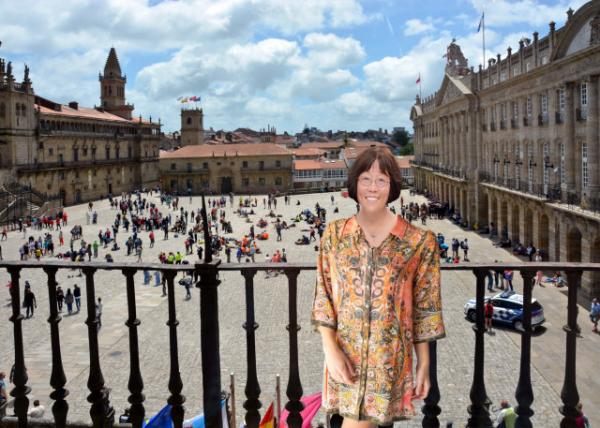 4 Emblematic Bldg of Obradoiro Square upon the 4 Pillars of the Galician Capital Religion, Attention to the Pilgrim, Public Administration, & University Education
4 Emblematic Bldg of Obradoiro Square upon the 4 Pillars of the Galician Capital Religion, Attention to the Pilgrim, Public Administration, & University Education
(工坊广场4栋标志性建筑·山丘省府宗教、朝圣者护理、公共管理和大学教育的四大支柱 06-15-2024)
 Obradoiro or Workshop Square Fusing Different Baroque, Gothic, Renaissance, or Neoclassical, Collecting the Cultural Legacy of More Than 700 Years of History
Obradoiro or Workshop Square Fusing Different Baroque, Gothic, Renaissance, or Neoclassical, Collecting the Cultural Legacy of More Than 700 Years of History
(工坊广场·融合了不同的巴洛克、哥特式、文艺复兴或新古典主义风格,并汇集了700多年历史的文化遗产)
 Large Groups of Pilgrims Clapping & Celebrating Their Completion of the Camino de Santigo upon Entering the Plaza & Congregate in the Obradoiro Square
Large Groups of Pilgrims Clapping & Celebrating Their Completion of the Camino de Santigo upon Entering the Plaza & Congregate in the Obradoiro Square
(大群朝圣者进入并聚集在工坊广场上鼓掌庆祝圣地亚哥朝圣之路的完成)
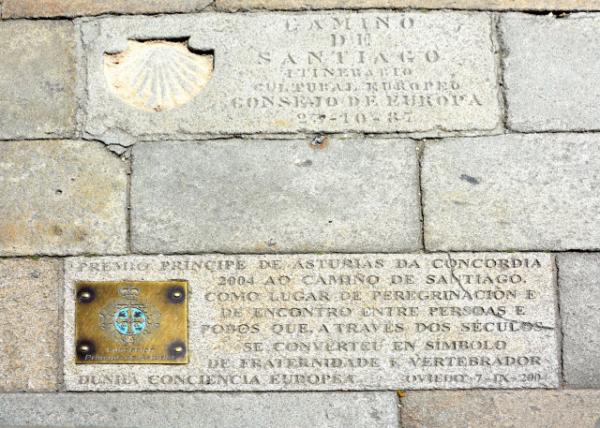 3 Great Pilgrimages of Christendom w/ Camino de Santiago, Jerusalem, & the Via Romea Francigena
3 Great Pilgrimages of Christendom w/ Camino de Santiago, Jerusalem, & the Via Romea Francigena
(基督教世界的三次伟大朝圣之旅·后继使徒朝圣之路、耶路撒冷“和平之城”和来自法国通往罗马的道路)
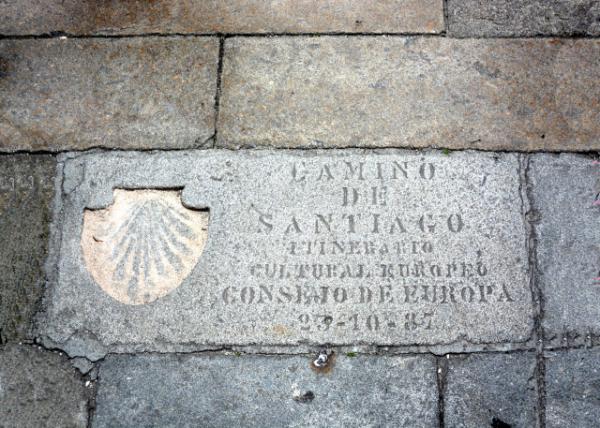 St James's Scallop Shell, a Symbol of the Route on the Ground Embleming of St James, Worn by Pilgrims
St James's Scallop Shell, a Symbol of the Route on the Ground Embleming of St James, Worn by Pilgrims
(后继使徒扇贝壳·指引朝圣者的后继使徒朝拜之路地面标示)
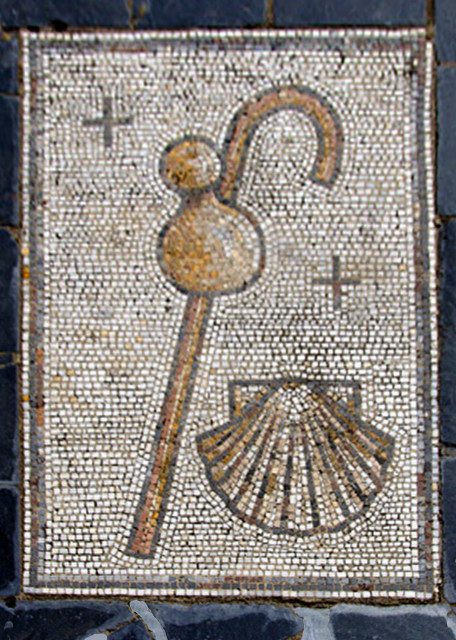
Pilgrimage Symbols of a Staff, a Gourd, & a Scallop Shell Depicted to St James, the Patron Saint of Spain
(西班牙守护神后继使徒朝圣之路的象征:权杖、葫芦和扇贝壳)

Church of San Fructuoso (多产圣徒教堂)
 Casa Barbantes, Galician Restaurant
Casa Barbantes, Galician Restaurant
(麻线之家·加利西亚“山丘”餐厅)
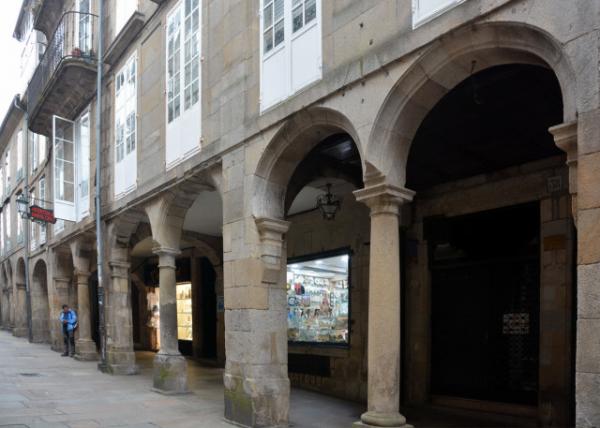 Destroyed by the Muslims @ the End of the 10th Century, Completely Rebuilt in the Following Century w/ Its Romanesque, Gothic, Its Baroque Bldgs
Destroyed by the Muslims @ the End of the 10th Century, Completely Rebuilt in the Following Century w/ Its Romanesque, Gothic, Its Baroque Bldgs
(10世纪末被穆斯林摧毁,随后一个世纪彻底重建,拥有罗马式、哥特式和巴洛克式建筑)

Rúa do Villar, Set of 6 Semicircular Arches Supported by Cylindrical Columns & a Square Base
(庄园街·由圆柱和方形底座支撑的6座半圆形拱门)

Rúa do Villar w/ Passage under Arcade Inside
(庄园街内有拱廊通道)
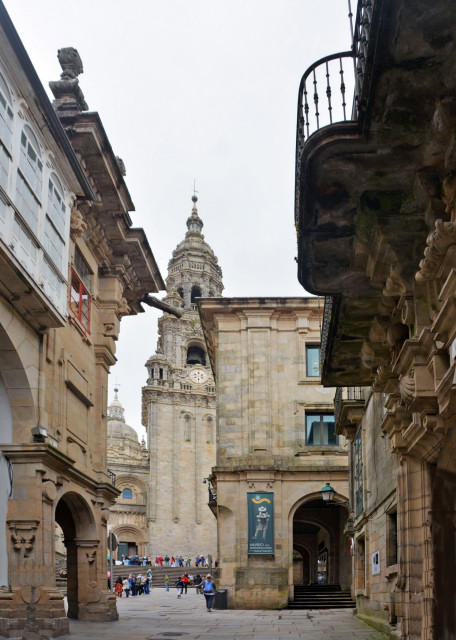
Torre da Berenguela Clock Tower from Rua do Villar
(庄园街上的三位一体塔钟楼)
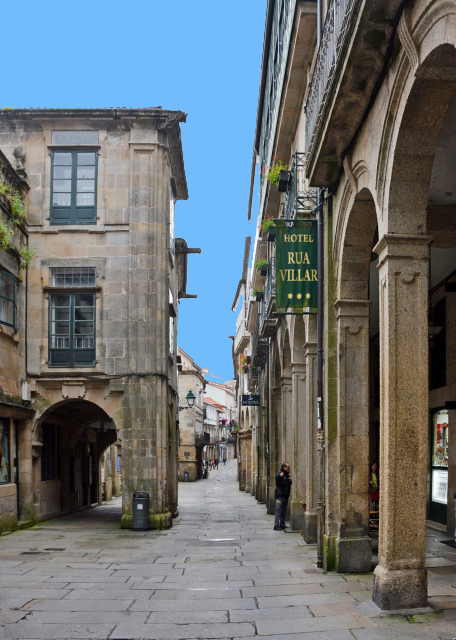
Porticoed Street (门廊街道)
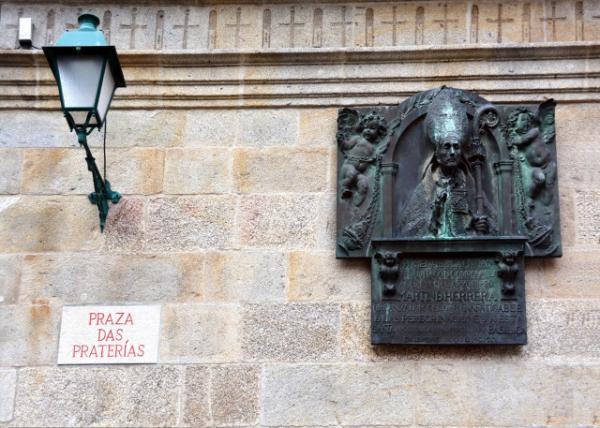 Plaza de las Pratarias, Tribute Plaque to Jose Martin de Herrera (1835-1922), Cardinal & Archbishop @ the Origin of the Birth of Regular & Organized Pilgrimages
Plaza de las Pratarias, Tribute Plaque to Jose Martin de Herrera (1835-1922), Cardinal & Archbishop @ the Origin of the Birth of Regular & Organized Pilgrimages
(银器广场·纪念红衣主教和大主教的匾额,这里是定期和有组织的朝圣活动起点)
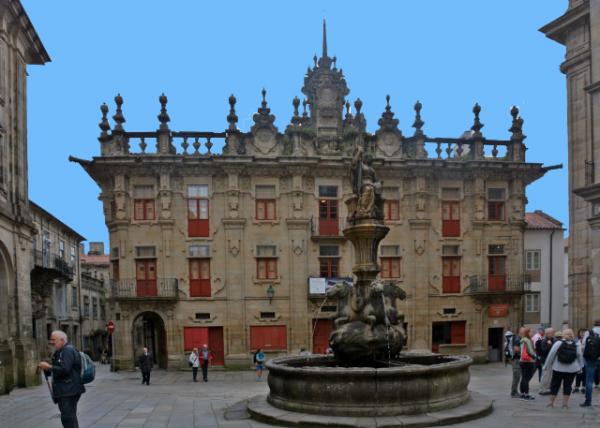 Casa do Cabido or Chapter House w/ Fountain of the Horses, a Sculpture of 4 Horses w/ Webbed Feet
Casa do Cabido or Chapter House w/ Fountain of the Horses, a Sculpture of 4 Horses w/ Webbed Feet
(宗教会议厅·带有四匹蹼足马雕的喷泉)
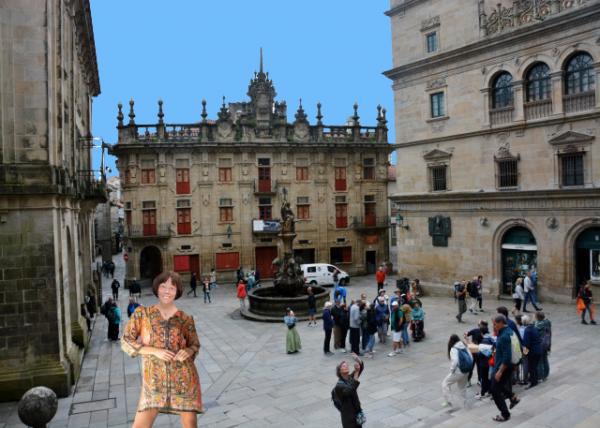 Praza de Praterías (银器广场 06-15-2024)
Praza de Praterías (银器广场 06-15-2024)
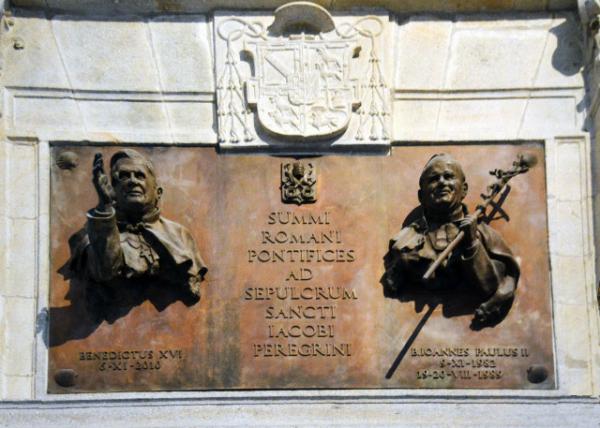 Popes Benedict XVI and John Paul II Romanesque Cathedral World Heritage Jacobean Way
Popes Benedict XVI and John Paul II Romanesque Cathedral World Heritage Jacobean Way
(教皇本笃十六世和神赐·谦卑二世标示——罗马式大教堂、世界遗产、后继使徒朝拜之路)

Parish of Our Lady the Ancient of Corticela in Romanesque Built in the 9th Century
(号角圣母古教堂·建于9世纪的罗马式建筑)
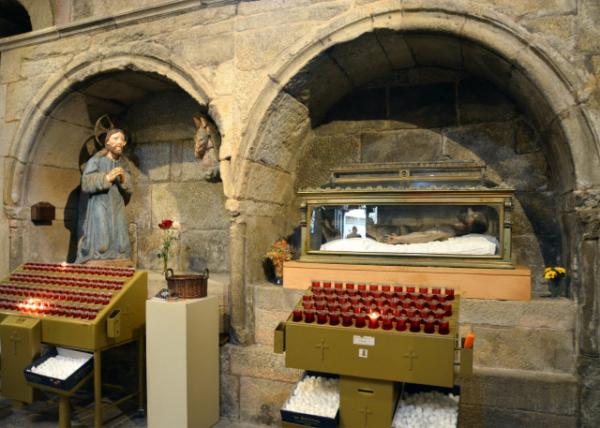 Parish of Our Lady the Ancient of Corticela, Prayers for the Growth of The Church
Parish of Our Lady the Ancient of Corticela, Prayers for the Growth of The Church
(号角圣母古教堂·为教会成长祈祷)
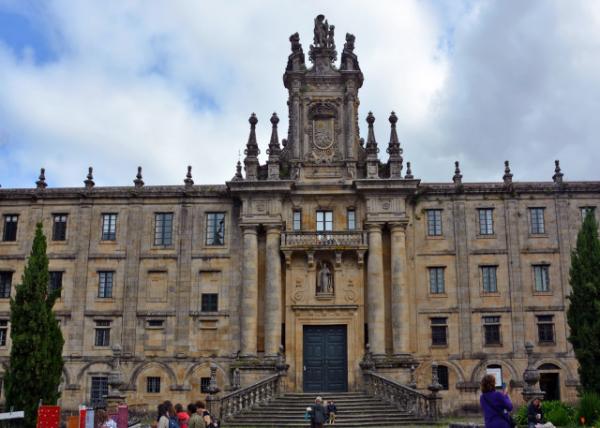 Monastery of San Marti?o Pinario in Renaissance, Baroque, & Neoclassical Rebuilt in the 16th Century
Monastery of San Marti?o Pinario in Renaissance, Baroque, & Neoclassical Rebuilt in the 16th Century
(文艺复兴时期的战神·松林修道院——16世纪重建的巴洛克风格和新古典主义建筑)
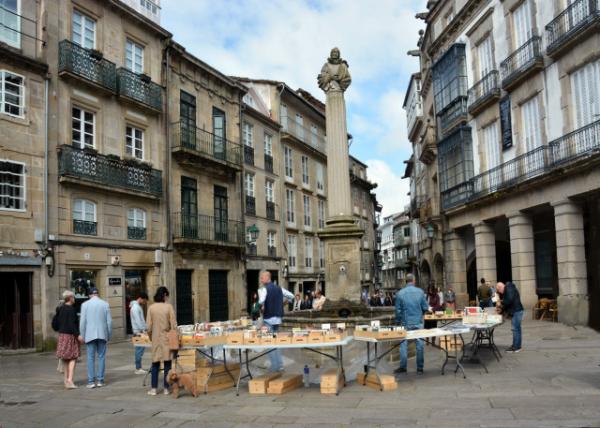 Praza de Cervantes w Bust of Cervant, City Market Held during Middle Ages & the Place where the official pregoeiro issued the archbishop's ordinances and the council
Praza de Cervantes w Bust of Cervant, City Market Held during Middle Ages & the Place where the official pregoeiro issued the archbishop's ordinances and the council
(塞万提斯“花花公子”半身像伫立于塞万提斯广场·中世纪城市集市以及主教发布大主教法令和会议的地方)

Sacred Heart Church or San Agustin in Baroque Style, Built in the 17th Century
(圣心或庄严圣徒教堂·建于17世纪,巴洛克风格)
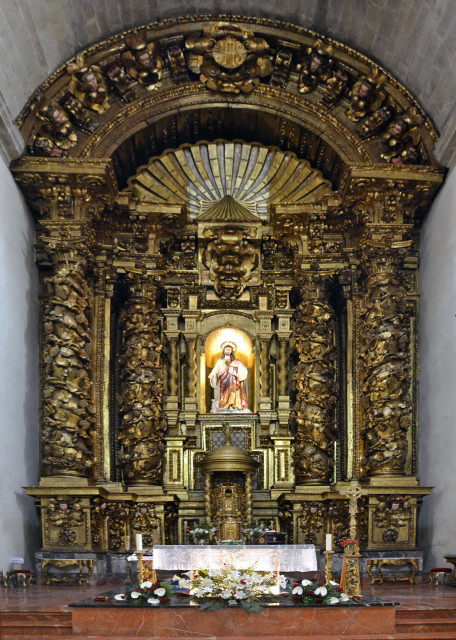
Altarpiece of Sacred Heart Church (圣心教堂·祭坛画)

Mercado de Abastos, Fresh Food Market Reminiscent of the Fa?ades of Romanesque Chapels Built in 1941
(阿巴斯托斯“农贸”市场·新鲜食品集市建筑让人想起1941年建造的古罗马式教堂外墙)
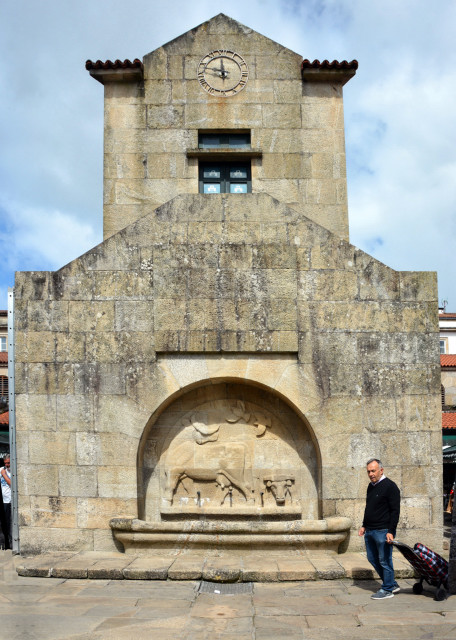
Mercado de Abastos w/ Water Fountain w/ a Scene of Grazing Cattle
(农贸市场·描绘牛群放牧场景的喷泉)
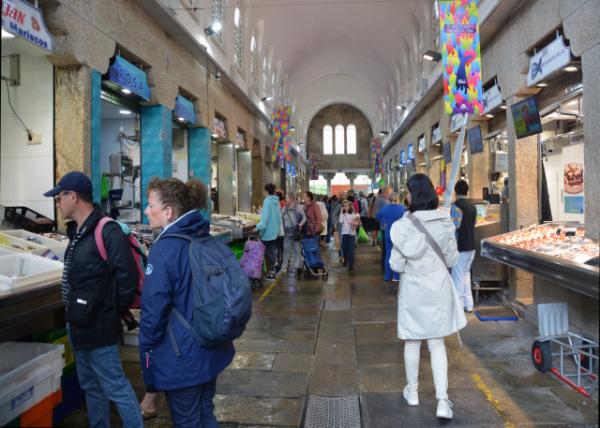 Mercado de Abastos Fish Market Stalls Greeted w/ an Awe-Inspiring Assortment of the Finest Galician Produce
Mercado de Abastos Fish Market Stalls Greeted w/ an Awe-Inspiring Assortment of the Finest Galician Produce
(农贸市场·鱼市摊位上摆满了山丘地区最优质的农产品)
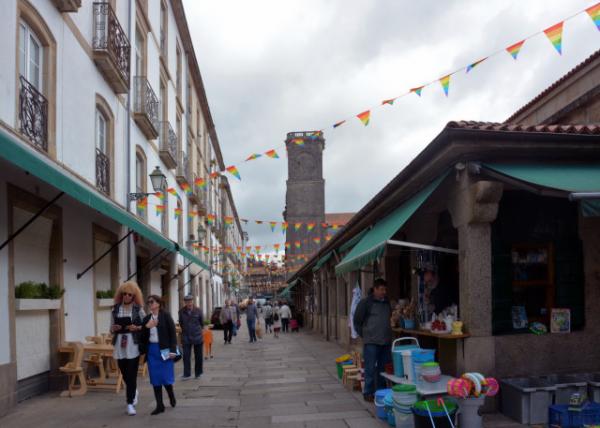 Rúa das Ameas (友街)
Rúa das Ameas (友街)
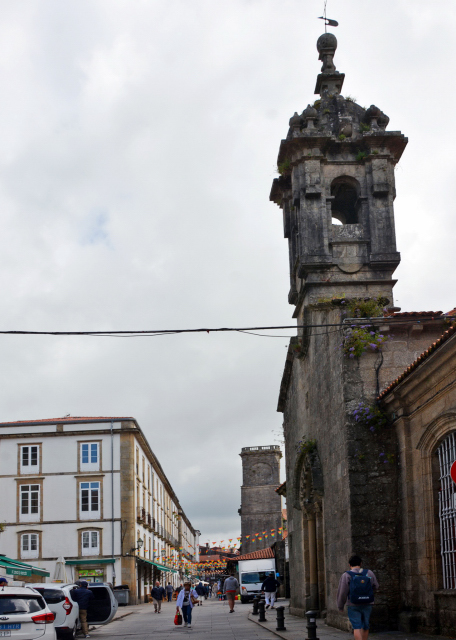
Church of Santa Comba de Carnota in Classical Baroque Style from the 18th Century
(18世纪古典巴洛克风格的石索圣徒教堂)
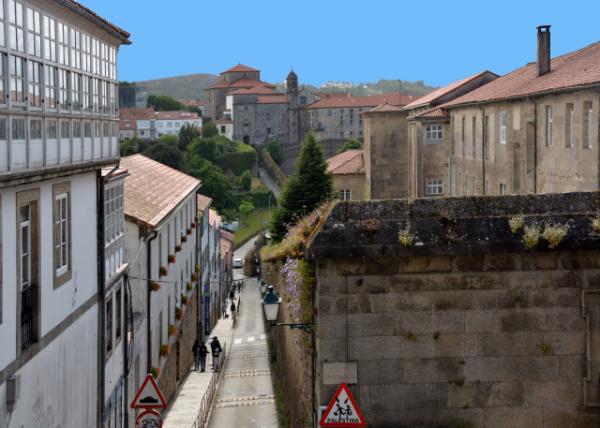 View of St. James Pilgrimage Way to Convent de Santa Maria de Belvis
View of St. James Pilgrimage Way to Convent de Santa Maria de Belvis
(前往骑士圣母修道院的后继使徒朝圣之路景观)
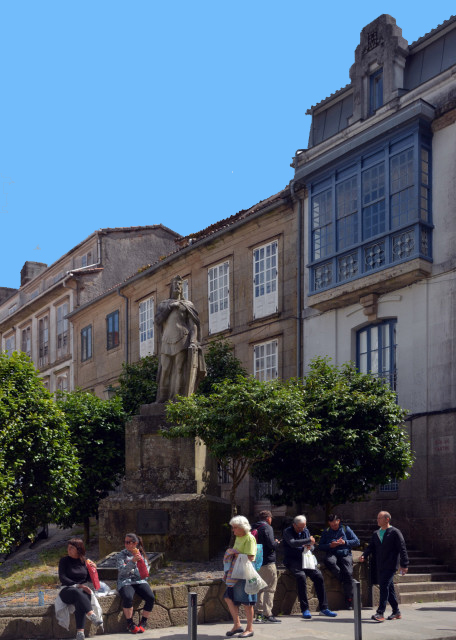
Rua do Castro, Statue of King Alfonso II of Asturias, a Tribute to the 1st Dignitary Made the 1st Pilgrimage to Santiago
(城堡街·阿斯图里亚斯“机敏”国王智者二世雕像,向第一位完成后继使徒朝圣的贵宾致敬)
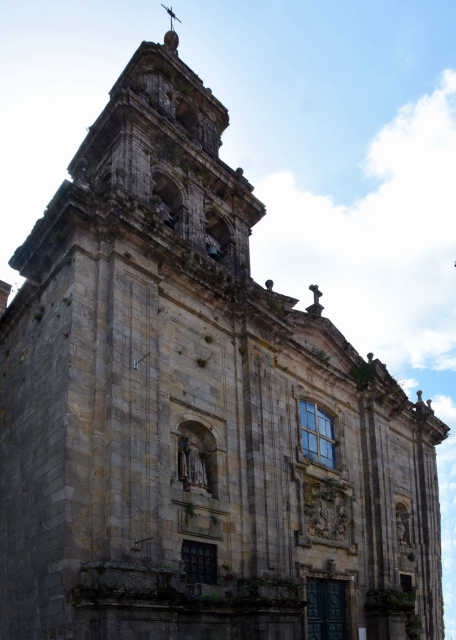
Church of the Society of Jesus w/ Its Ornamental Nakedness on the Outside, Finished in 1767
(耶稣会教堂·外部裸露的装饰,1767年完工)
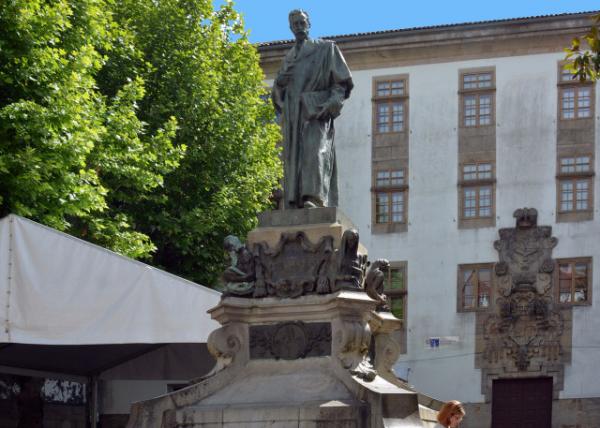 Plaza de Mazareios by the Library of the University
Plaza de Mazareios by the Library of the University
(大学图书馆旁西班牙征服者广场)
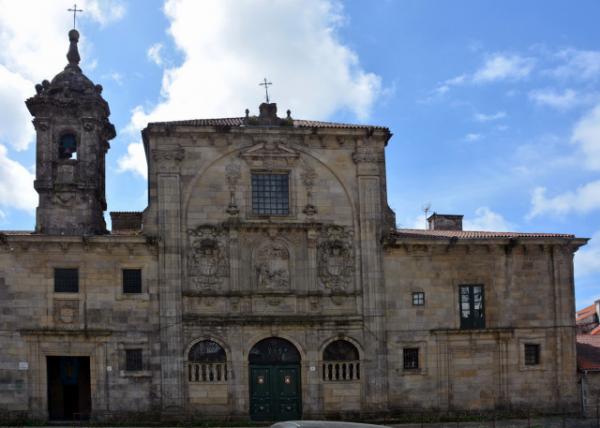 Convent of the Mercedarian Mothers Founded in the 2nd Half of the 17th Century Opposite to the Iconic Mazarelos Gate, the Only Remained One from the Old City Wall
Convent of the Mercedarian Mothers Founded in the 2nd Half of the 17th Century Opposite to the Iconic Mazarelos Gate, the Only Remained One from the Old City Wall
(慈悲修女院建·建于17世纪下半叶,位于标志性的工具匠拱门对面,是古城墙上唯一残存的城门)
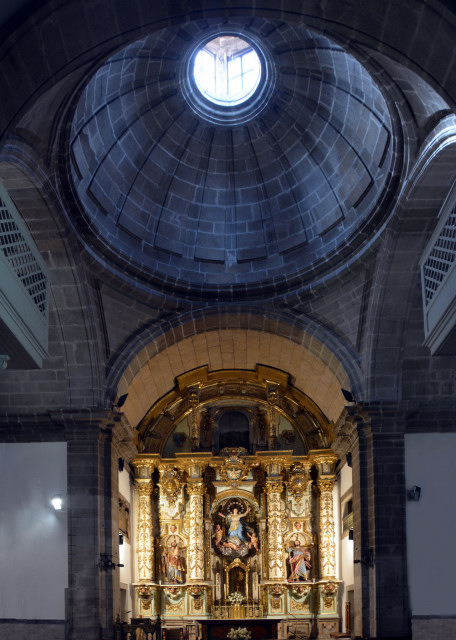
Igrexa das Orfas or Church of the Orphans w/ Coffered Ceilings
(孤儿院教堂·饰有格子天花板)
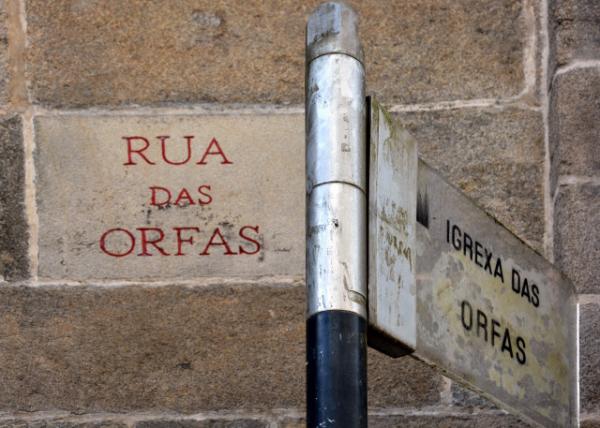 The Postsign of Rua das Orfas (孤儿街路牌)
The Postsign of Rua das Orfas (孤儿街路牌)
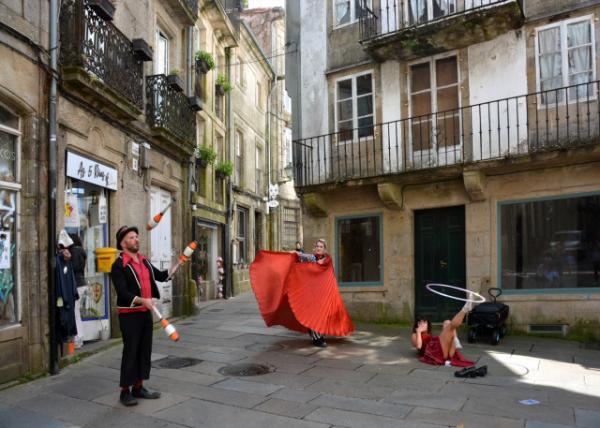 Galician Performance (山丘地区街头艺术表演)
Galician Performance (山丘地区街头艺术表演)
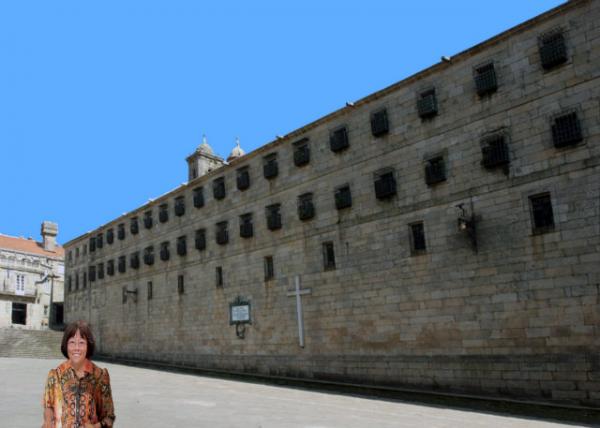 Monastery of St Pelagius of Antealtares @ Quintana Square
Monastery of St Pelagius of Antealtares @ Quintana Square
(位于农贸广场的祭坛前大海圣徒修道院)
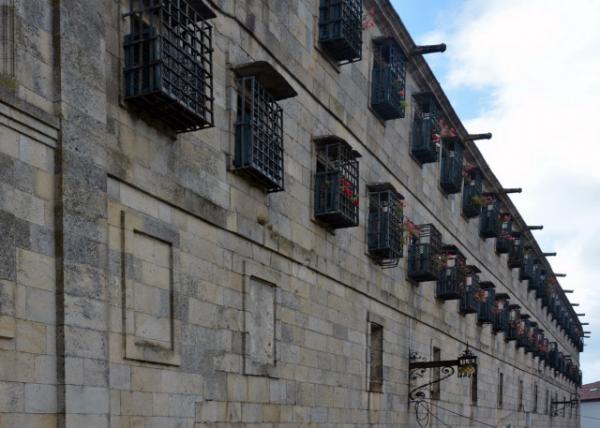 The Monastery of St Pelagius of Antealtares Founded in the 11th Century
The Monastery of St Pelagius of Antealtares Founded in the 11th Century
(祭坛前大海圣徒修道院·建于11世纪)
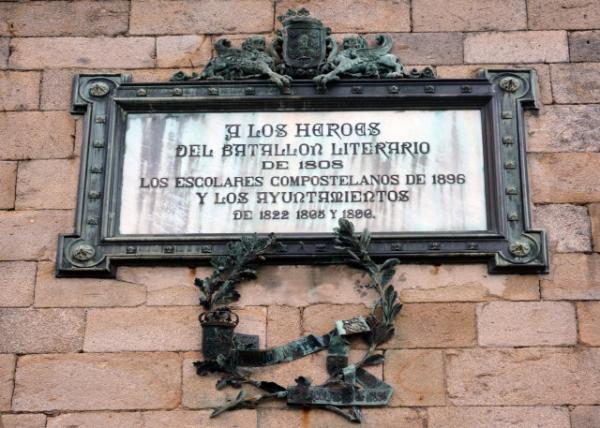 Plaque of Literary Battalion in Memory of a Military Company Composed of Students from the Univ of Santiago de Compostela Fought in the Spanish War of Independence
Plaque of Literary Battalion in Memory of a Military Company Composed of Students from the Univ of Santiago de Compostela Fought in the Spanish War of Independence
(知识分子营匾·纪念参与西班牙独立战争的星野的后继使徒大学军事连队)
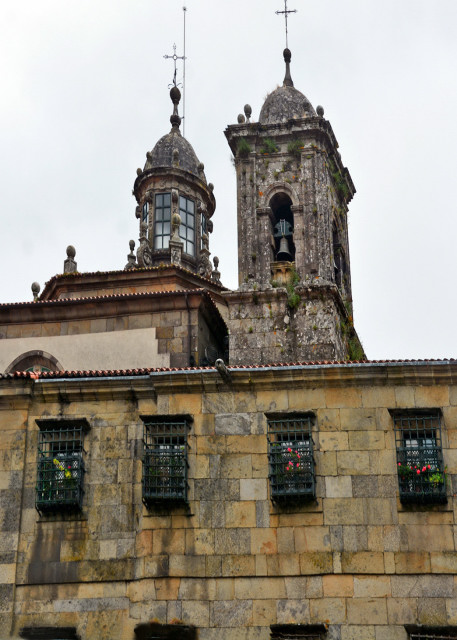
Bell Towers of Monastery of St Pelagius of Antealtares
(祭坛前大海圣徒修道院·钟楼)
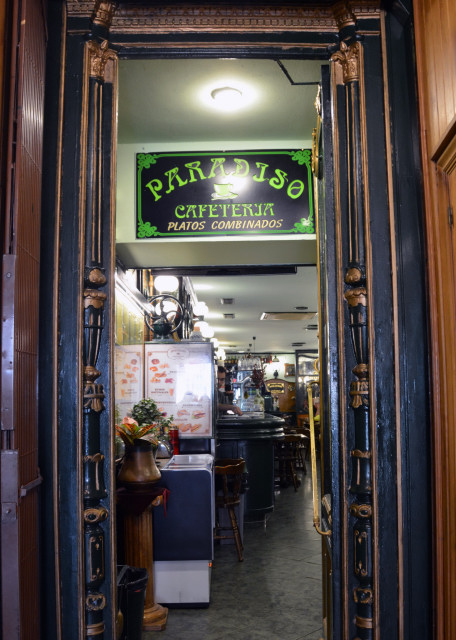
Paradise Cafetería, the Most Famous Caféin the Old Town
(天堂咖啡馆·老城最著名的甜品屋)
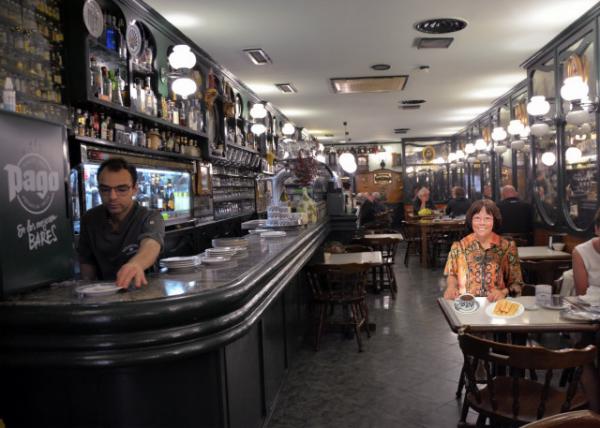 Paradise Cafetería w/ Churros Dipped in Hot Chocolate
Paradise Cafetería w/ Churros Dipped in Hot Chocolate
(天堂咖啡馆·西班牙油条佐以热巧克力 06-15-2024)
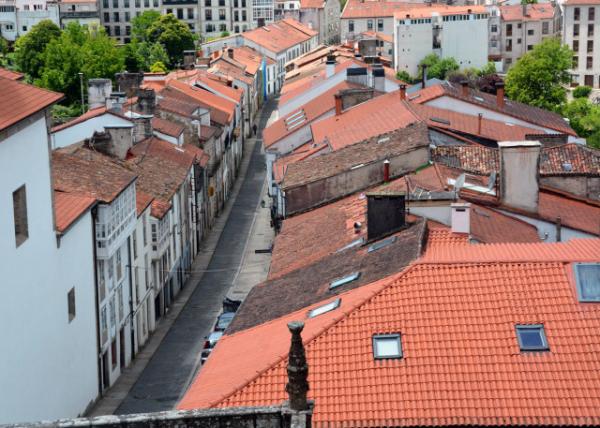 High-angle View of the Street amidst Red-Roofs in Town
High-angle View of the Street amidst Red-Roofs in Town
(老城红屋顶街道俯视景观)
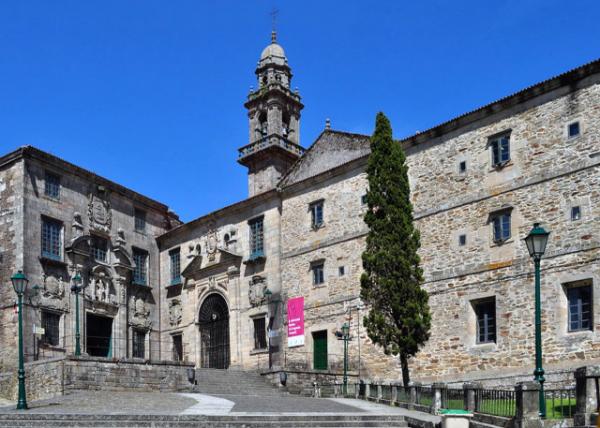 Museum of the Galician People, Former Convent of Santo Domingo de Bonaval
Museum of the Galician People, Former Convent of Santo Domingo de Bonaval
(山丘人民博物馆·前自由圣徒修女院)
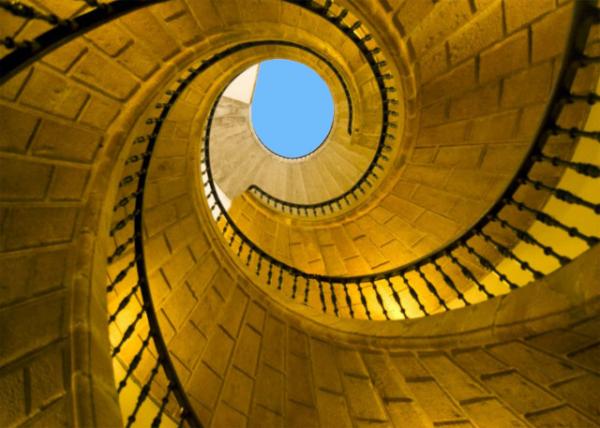 The Old Convent of St Dominic w/ Triple Helical Staircase of the 17th & 18th Centuries
The Old Convent of St Dominic w/ Triple Helical Staircase of the 17th & 18th Centuries
(老自由圣徒修女院·17和18世纪的三重螺旋楼梯)
Crosslinks(相关博文):
